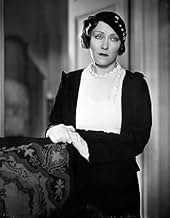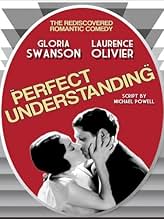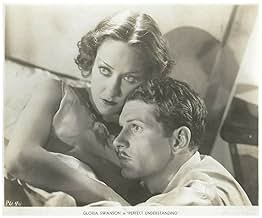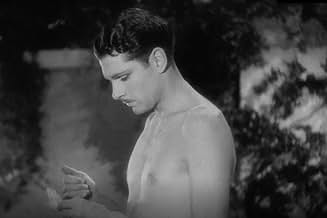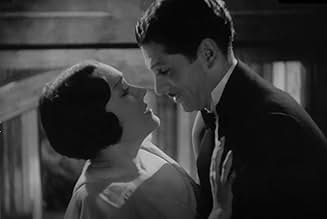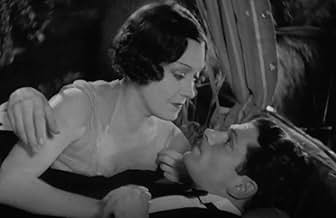Agrega una trama en tu idiomaA young couple decide to marry under the condition that they agree never to disagree. That agreement is soon put to the test when the husband finds himself attracted to a beautiful young wom... Leer todoA young couple decide to marry under the condition that they agree never to disagree. That agreement is soon put to the test when the husband finds himself attracted to a beautiful young woman.A young couple decide to marry under the condition that they agree never to disagree. That agreement is soon put to the test when the husband finds himself attracted to a beautiful young woman.
- Dirección
- Guionistas
- Elenco
Evalyn Bostock
- Maid
- (sin créditos)
Syd Crossley
- Butler
- (sin créditos)
Opiniones destacadas
A young, moustached Olivier looks extremely ill at ease in this good-looking but garrulous and boring marital drama set in the South of France but with hardly any of the cast actually leaving the studio. He later called it "the worst film ever made"; presumably that was before he made 'The Betsy'!
Perfect Understanding (1933)
* 1/2 (out of 4)
With her star quality fading, Gloria Swanson went to England to produce this melodrama, which when released would just harm her career even more as it failed with both fans and critics. Judy (Swanson) and Nicholas (Laurence Olivier) agree to get married with the "perfect understanding" that they never argue or disagree. All goes as planned until Nicholas takes a trip to Cannes where he falls for another woman. PERFECT UNDERSTANDING is the perfect example of legends doing an awful film. There's really no doubt about it but this thing is just deadly dull from the word go and it never picks up any steam. It's easy to see why the movie was such a disaster when it was originally released but the most confusing thing is why Swanson decided to produce this herself and in England. I mean, this type of melodrama was flowing from every small and major studio in America so going to England really didn't do anything to improve the film. Even worse is that we have so many boring dialogue scenes that just drag everything out that the viewer will be wanting to stick sharp knives in their eyes. Things don't get any better once Olivier does the cheating as we get some pretty boring situations leading to a finale, which is just downright awful. It seems the film wants to return to Swanson's glory silent days because the picture really does look and feel like a silent at times but it's done in such a way that the entire thing just seems old-fashioned and it just doesn't work with the dialogue. Swanson is good in her role but sadly she's not given too much to do. Olivier is excellent in his part but one wishes the great performance was going towards a better cause. PERFECT UNDERSTANDING had pretty much been forgotten for over seven decades until it was brought back up to the surface but sadly, only die-hard fans of the stars should even bother with it.
* 1/2 (out of 4)
With her star quality fading, Gloria Swanson went to England to produce this melodrama, which when released would just harm her career even more as it failed with both fans and critics. Judy (Swanson) and Nicholas (Laurence Olivier) agree to get married with the "perfect understanding" that they never argue or disagree. All goes as planned until Nicholas takes a trip to Cannes where he falls for another woman. PERFECT UNDERSTANDING is the perfect example of legends doing an awful film. There's really no doubt about it but this thing is just deadly dull from the word go and it never picks up any steam. It's easy to see why the movie was such a disaster when it was originally released but the most confusing thing is why Swanson decided to produce this herself and in England. I mean, this type of melodrama was flowing from every small and major studio in America so going to England really didn't do anything to improve the film. Even worse is that we have so many boring dialogue scenes that just drag everything out that the viewer will be wanting to stick sharp knives in their eyes. Things don't get any better once Olivier does the cheating as we get some pretty boring situations leading to a finale, which is just downright awful. It seems the film wants to return to Swanson's glory silent days because the picture really does look and feel like a silent at times but it's done in such a way that the entire thing just seems old-fashioned and it just doesn't work with the dialogue. Swanson is good in her role but sadly she's not given too much to do. Olivier is excellent in his part but one wishes the great performance was going towards a better cause. PERFECT UNDERSTANDING had pretty much been forgotten for over seven decades until it was brought back up to the surface but sadly, only die-hard fans of the stars should even bother with it.
That's the song Gloria sings over the closing credits; the reverse could be emblematic of the film, a trying-to-be-chic trifle that is nonetheless amusing in its stilted sophistication and odd cinematography. Gloria and Olivier swan about modern London--she's an American interior decorator, he appears to be independently wealthy--and do some rather pre-Code making out before deciding to marry. Misunderstandings quickly pile up as each, though nominally terribly terribly in love with each other, contemplate extramarital affairs. There's also intrigue about his suspicion that she's carrying someone else's child--it's far too racy to have been made in the U.S. at the time, and was filmed in Britain by Gloria's production company. The dialogue strains to be Somerset Maugham witty and the supporting cast is nothing special, though Miles Malleson has a nice bit. Gloria is certainly glamorous and good at eye-batting, and Olivier, playing a spoiled bachelor it's hard to root for, has some charm. Also fun is the hilariously overemphatic musical scoring--every comma seems to be accentuated with a crescendo. Not much of a movie, but an interesting look at two stars at uncomfortable times in their film careers.
Gloria Swanson had formed a film company just to make this film. Unfortunately, this is precisely the type of film that her most famous character, Norma Desmond, likely wanted to make in Sunset Boulevard.
It is really a silent film with dialog replacing the text screens. The actors make grand extravagant gestures, turn their faces to and fro while fluttering their eyelids. The incessant music swells at appropriate moments to indicate high drama. The dialog seems like a nuisance to be summarily added and neglected - after all Swanson had done pretty well for all those years without dialog - why worry about that now.
The quite modern premise of the film, a semi-open marriage, and the conflict brought on by the juxtaposition of the end of the flapper era avant-garde attitudes with the conservative Victorian mores ensconced in the judicial attitude towards divorce should have made the film more interesting that it was.
However, the only real interest and tension is generated by incredible boat race where cocktails are drunk at every station to make the race more difficult! Prohibition was about to be repealed and the celebration of alcohol consumption in such stark contrast to today's attitudes is fascinating.
Tighter editing, better pacing and dialog might have made this worthwhile. As is, it is a curio from the early years of sound, and of interest to the historian and perhaps to the film buff as a primer on the world of Norma Desmond.
It is really a silent film with dialog replacing the text screens. The actors make grand extravagant gestures, turn their faces to and fro while fluttering their eyelids. The incessant music swells at appropriate moments to indicate high drama. The dialog seems like a nuisance to be summarily added and neglected - after all Swanson had done pretty well for all those years without dialog - why worry about that now.
The quite modern premise of the film, a semi-open marriage, and the conflict brought on by the juxtaposition of the end of the flapper era avant-garde attitudes with the conservative Victorian mores ensconced in the judicial attitude towards divorce should have made the film more interesting that it was.
However, the only real interest and tension is generated by incredible boat race where cocktails are drunk at every station to make the race more difficult! Prohibition was about to be repealed and the celebration of alcohol consumption in such stark contrast to today's attitudes is fascinating.
Tighter editing, better pacing and dialog might have made this worthwhile. As is, it is a curio from the early years of sound, and of interest to the historian and perhaps to the film buff as a primer on the world of Norma Desmond.
I first saw Gloria Swanson in "Sunset Blvd" (1950) and loved her in the movie. She played an actress who was past her prime yet behaved as though she was in her heyday. Throughout the movie it was as though she was always on stage, which is how I imagine actors and actresses behave when they try to hold on to their glory days. Her movements, expressions, and speech were exaggerated like there was a camera focused on her at all times.
After watching "Perfect Understanding" I realize that's just the way Gloria Swanson acts. As good as she was in "Sunset Blvd" she was equally terrible in "Perfect Understanding." The speech, the expressions, and the behavior were exaggerated and made even more comical by the music. And she and Joan Crawford have mastered the frozen, wide-eyed, crazy look which looks so unnatural.
In "Perfect Understanding" Swanson plays Judy Rogers, a high society woman from America who was in love with Nicholas Randall (Laurence Olivier), a high society man from England. The two were crazy in love, but Judy wasn't keen on the idea of marriage, no matter how many times Nicholas proposed. Eventually, Judy gave in and agreed to marry Nicholas with a contract stating that they'd always have a "perfect understanding" and that they'd "never be husband and wife but lover and mistress. And above everything else, to remain individual."
To Judy, jealousy was an ugly trait only to be found in commoners or the insecure. She'd have the opportunity to put her beliefs to the test because orbiting around her and Nicholas was Stephanie (Nora Swindburne), a married woman who was unabashedly in love with Nicholas. She would ruin her own marriage as well as Nicholas's if given the chance.
"Perfect Understanding" followed a predictable pattern. Unfortunately, it was another high-society movie involving grand exclamations of love and affection as well as rampant infidelity. It's a tired theme that's simply redone with new actors and a slightly adjusted script. The moment I saw Stephanie ogling Nicholas I knew what we were in for. There was nothing novel about this movie nor was there anything worth watching unless you're a fan of Gloria Swanson or Laurence Olivier.
Free on YouTube.
After watching "Perfect Understanding" I realize that's just the way Gloria Swanson acts. As good as she was in "Sunset Blvd" she was equally terrible in "Perfect Understanding." The speech, the expressions, and the behavior were exaggerated and made even more comical by the music. And she and Joan Crawford have mastered the frozen, wide-eyed, crazy look which looks so unnatural.
In "Perfect Understanding" Swanson plays Judy Rogers, a high society woman from America who was in love with Nicholas Randall (Laurence Olivier), a high society man from England. The two were crazy in love, but Judy wasn't keen on the idea of marriage, no matter how many times Nicholas proposed. Eventually, Judy gave in and agreed to marry Nicholas with a contract stating that they'd always have a "perfect understanding" and that they'd "never be husband and wife but lover and mistress. And above everything else, to remain individual."
To Judy, jealousy was an ugly trait only to be found in commoners or the insecure. She'd have the opportunity to put her beliefs to the test because orbiting around her and Nicholas was Stephanie (Nora Swindburne), a married woman who was unabashedly in love with Nicholas. She would ruin her own marriage as well as Nicholas's if given the chance.
"Perfect Understanding" followed a predictable pattern. Unfortunately, it was another high-society movie involving grand exclamations of love and affection as well as rampant infidelity. It's a tired theme that's simply redone with new actors and a slightly adjusted script. The moment I saw Stephanie ogling Nicholas I knew what we were in for. There was nothing novel about this movie nor was there anything worth watching unless you're a fan of Gloria Swanson or Laurence Olivier.
Free on YouTube.
¿Sabías que…?
- TriviaMichael Farmer's acting was so bad that, despite being married to the movie's star and main backer Gloria Swanson, he was all but edited out of the movie, giving more screentime to Sir Laurence Olivier.
- Citas
Ivan Ronnson: Jealousy is a wild beast.
- ConexionesFeatured in Boulevard! A Hollywood Story (2021)
- Bandas sonorasI Love You So Much That I Hate You
(uncredited)
Music by Henry Sullivan
Lyrics by Rowland Leigh
Sung by Gloria Swanson
Selecciones populares
Inicia sesión para calificar y agrega a la lista de videos para obtener recomendaciones personalizadas
Detalles
- Tiempo de ejecución1 hora 20 minutos
- Color
- Relación de aspecto
- 1.37 : 1
Contribuir a esta página
Sugiere una edición o agrega el contenido que falta


